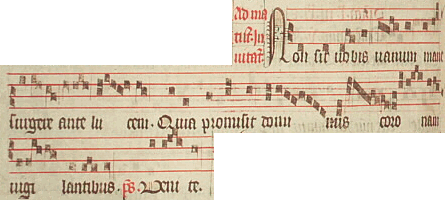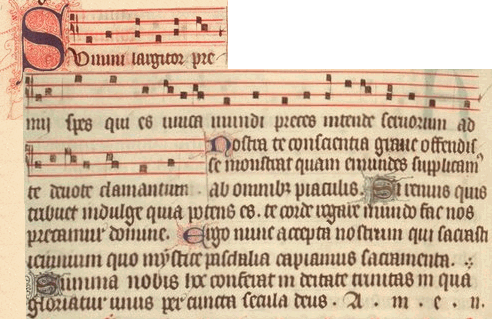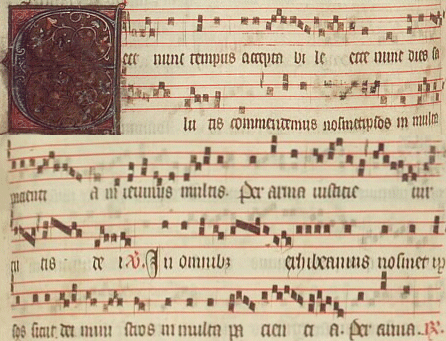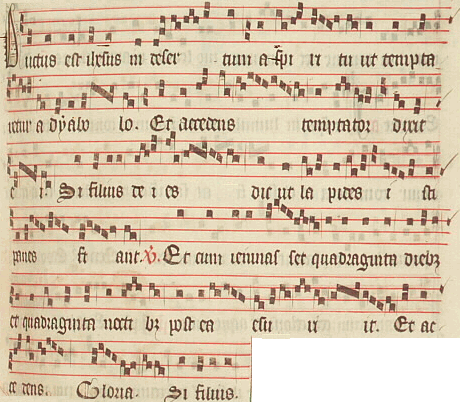READINGS: LENT SUNDAY I
לֹא עַל־הַלֶּחֶם לְבַדּוֹ יִחְיֶה הָאָדָם — כִּי
עַל־כָּל־מוֹצָא פִי־יְהוָה יִחְיֶה
הָאָדָם׃ Even Years: Exodus 5:1—6:1
וְאַחַר
בָּאוּ
מֹשֶׁה
וְאַהֲרֹן
וַיֹּאמְרוּ
אֶל־פַּרְעֹה
כֹּה־אָמַר
יְהוָה אֱלֹהֵי
יִשְׂרָאֵל
שַׁלַּח
אֶת־עַמִּי
וְיָחֹגּוּ
לִי
בַּמִּדְבָּר׃ וַיֹּאמֶר
פַּרְעֹה מִי
יְהוָה
אֲשֶׁר אֶשְׁמַע
בְּקֹלוֹ
לְשַׁלַּח
אֶת־יִשְׂרָאֵל
לֹא
יָדַעְתִּי
אֶת־יְהוָה וְגַם
אֶת־יִשְׂרָאֵל
לֹא
אֲשַׁלֵּחַ׃ וַיֹּאמְרוּ
אֱלֹהֵי
הָעִבְרִים
נִקְרָא עָלֵינוּ
נֵלֲכָה נָּא
דֶּרֶךְ
שְׁלֹשֶׁת יָמִים
בַּמִּדְבָּר
וְנִזְבְּחָה
לַיהוָה
אֱלֹהֵינוּ
פֶּן־יִפְגָּעֵנוּ
בַּדֶּבֶר
אוֹ בֶחָרֶב׃ וַיֹּאמֶר
אֲלֵהֶם
מֶלֶךְ
מִצְרַיִם
לָמָּה מֹשֶׁה
וְאַהֲרֹן
תַּפְרִיעוּ
אֶת־הָעָם מִמַּעֲשָׂיו
לְכוּ
לְסִבְלֹתֵיכֶם׃ וַיֹּאמֶר
פַּרְעֹה
הֵן־רַבִּים
עַתָּה עַם
הָאָרֶץ
וְהִשְׁבַּתֶּם
אֹתָם
מִסִּבְלֹתָם׃
וַיְצַו
פַּרְעֹה
בַּיּוֹם
הַהוּא
אֶת־הַנֹּגְשִׂים
בָּעָם
וְאֶת־שֹׁטְרָיו
לֵאמֹר׃ לֹא
תֹאסִפוּן
לָתֵת תֶּבֶן
לָעָם
לִלְבֹּן
הַלְּבֵנִים
כִּתְמוֹל
שִׁלְשֹׁם
הֵם יֵלְכוּ
וְקֹשְׁשׁוּ
לָהֶם
תֶּבֶן׃ וְאֶת־מַתְכֹּנֶת
הַלְּבֵנִים
אֲשֶׁר הֵם
עֹשִׂים
תְּמוֹל
שִׁלְשֹׁם
תָּשִׂימוּ עֲלֵיהֶם
לֹא
תִגְרְעוּ
מִמֶּנּוּ
כִּי־נִרְפִּים
הֵם עַל־כֵּן
הֵם צֹעֲקִים
לֵאמֹר
נֵלְכָה
נִזְבְּחָה
לֵאלֹהֵינוּ׃ תִּכְבַּד
הָעֲבֹדָה
עַל־הָאֲנָשִׁים
וְיַעֲשׂוּ־בָהּ
וְאַל־יִשְׁעוּ
בְּדִבְרֵי־שָׁקֶר׃
וַיֵּצְאוּ
נֹגְשֵׂי
הָעָם
וְשֹׁטְרָיו
וַיֹּאמְרוּ
אֶל־הָעָם
לֵאמֹר כֹּה
אָמַר פַּרְעֹה
אֵינֶנִּי
נֹתֵן לָכֶם
תֶּבֶן׃ אַתֶּם
לְכוּ קְחוּ
לָכֶם תֶּבֶן
מֵאֲשֶׁר
תִּמְצָאוּ
כִּי אֵין
נִגְרָע
מֵעֲבֹדַתְכֶם
דָּבָר׃ וַיָּפֶץ
הָעָם
בְּכָל־אֶרֶץ
מִצְרָיִם לְקֹשֵׁשׁ
קַשׁ
לַתֶּבֶן׃ וְהַנֹּגְשִׂים
אָצִים
לֵאמֹר
כַּלּוּ מַעֲשֵׂיכֶם
דְּבַר־יוֹם
בְּיוֹמוֹ
כַּאֲשֶׁר
בִּהְיוֹת
הַתֶּבֶן׃ וַיֻּכּוּ
שֹׁטְרֵי
בְּנֵי
יִשְׂרָאֵל
אֲשֶׁר־שָׂמוּ
עֲלֵהֶם
נֹגְשֵׂי
פַרְעֹה לֵאמֹר
מַדּוּעַ לֹא
כִלִּיתֶם
חָקְכֶם לִלְבֹּן
כִּתְמוֹל
שִׁלְשֹׁם
גַּם־תְּמוֹל
גַּם־הַיּוֹם׃
וַיָּבֹאוּ
שֹׁטְרֵי
בְּנֵי
יִשְׂרָאֵל וַיִּצְעֲקוּ
אֶל־פַּרְעֹה
לֵאמֹר
לָמָּה תַעֲשֶׂה
כֹה
לַעֲבָדֶיךָ׃ תֶּבֶן
אֵין נִתָּן
לַעֲבָדֶיךָ
וּלְבֵנִים
אֹמְרִים
לָנוּ עֲשׂוּ
וְהִנֵּה
עֲבָדֶיךָ
מֻכִּים
וְחָטָאת
עַמֶּךָ׃ וַיֹּאמֶר
נִרְפִּים
אַתֶּם
נִרְפִּים עַל־כֵּן
אַתֶּם
אֹמְרִים
נֵלְכָה
נִזְבְּחָה
לַיהוָה׃ וְעַתָּה
לְכוּ
עִבְדוּ וְתֶבֶן
לֹא־יִנָּתֵן
לָכֶם
וְתֹכֶן
לְבֵנִים
תִּתֵּנּוּ׃
וַיִּרְאוּ
שֹׁטְרֵי
בְנֵי־יִשְׂרָאֵל
אֹתָם בְּרָע
לֵאמֹר
לֹא־תִגְרְעוּ
מִלִּבְנֵיכֶם
דְּבַר־יוֹם
בְּיוֹמוֹ׃ וַיִּפְגְּעוּ
אֶת־מֹשֶׁה
וְאֶת־אַהֲרֹן
נִצָּבִים
לִקְרָאתָם
בְּצֵאתָם
מֵאֵת פַּרְעֹה׃ וַיֹּאמְרוּ
אֲלֵהֶם
יֵרֶא יְהוָה
עֲלֵיכֶם
וְיִשְׁפֹּט
אֲשֶׁר
הִבְאַשְׁתֶּם
אֶת־רֵיחֵנוּ
בְּעֵינֵי
פַרְעֹה
וּבְעֵינֵי עֲבָדָיו
לָתֶת־חֶרֶב
בְּיָדָם
לְהָרְגֵנוּ׃
וַיָּשָׁב
מֹשֶׁה
אֶל־יְהוָה
וַיֹּאמַר אֲדֹנָי
לָמָה
הֲרֵעֹתָה
לָעָם הַזֶּה
לָמָּה זֶּה
שְׁלַחְתָּנִי׃ וּמֵאָז
בָּאתִי
אֶל־פַּרְעֹה
לְדַבֵּר בִּשְׁמֶךָ
הֵרַע לָעָם
הַזֶּה
וְהַצֵּל לֹא־הִצַּלְתָּ
אֶת־עַמֶּךָ׃
וַיֹּאמֶר
יְהוָה
אֶל־מֹשֶׁה
עַתָּה תִרְאֶה
אֲשֶׁר
אֶעֱשֶׂה
לְפַרְעֹה
כִּי בְיָד חֲזָקָה
יְשַׁלְּחֵם
וּבְיָד
חֲזָקָה יְגָרְשֵׁם
מֵאַרְצוֹ׃
6 That very day, Pharaoh gave the order to the people's taskmasters and their scribes, 7 'Do not go on providing the people with straw for brickmaking as before; let them go and gather straw for themselves. 8 But you will exact the same quantity of bricks from them as before, not reducing it at all, since they are lazy, and that is why their cry is, "Let us go and sacrifice to our God." 9 Give these people more work to do, and see they do it instead of listening to lying speeches.'
10 The people's taskmasters and scribes went out to speak to the people and said, 'Pharaoh says this, "I shall not provide you with any more straw. 11 Go and collect straw for yourselves where you can find it. But your output is not to be any less." ' 12 So the people scattered all over Egypt to gather stubble for their straw. 13 The taskmasters harassed them. 'You must complete your daily quota,' they said, 'just as when the straw was there.'
14 And the Israelites' foremen whom Pharaoh's taskmasters had put in charge of them, were flogged and asked, 'Why have you not fulfilled your quota of bricks made today as before?' 15 The Israelites' foremen went and appealed to Pharaoh. 'Why do you treat your servants like this?' they said. 16 'No straw is provided for your servants, yet still the cry is, "Make bricks!" And now your servants are being flogged!...' 17 'You are lazy, lazy,' he retorted. 'That is why you say, "Let us go and sacrifice to Yahweh." 18 Get back to your work at once. You will not be provided with straw; all the same, you will deliver the quota of bricks.'
19 The Israelites' foremen saw they were in a difficult position on being told, 'You will not reduce your daily production of bricks.' 20 As they left Pharaoh's presence, they met Moses and Aaron who were standing in their way. 21 'May Yahweh look down at you and judge!' they said to them. 'You have brought us into bad odour with Pharaoh and his officials; you have put a sword into their hand to kill us.'
22 Moses went back to Yahweh and said, 'Lord, why do you treat this people so harshly? Why did you send me? 23 Ever since I came to Pharaoh and spoke to him in your name, he has ill-treated this people, and you have done nothing at all about rescuing your people.'
6:1 Yahweh then said to Moses, 'Now you will see what I am going to do to Pharaoh. A mighty hand will force him to let them go, a mighty hand will force him to expel them from his country.'
Odd Years: Deuteronomy 6:4-25
4 שְׁמַע
יִשְׂרָאֵל
יְהוָה
אֱלֹהֵינוּ
יְהוָה
אֶחָד׃
10 'When Yahweh has brought you into the country which he swore to your ancestors Abraham, Isaac and Jacob that he would give you, with great and prosperous cities you have not built, 11 with houses full of good things you have not provided, with wells you have not dug, with vineyards and olive trees you have not planted, and then, when you have eaten as much as you want, 12 be careful you do not forget Yahweh who has brought you out of Egypt, out of the place of slave-labour.
13 Yahweh your God is the one you must fear, him alone you must serve, his is the name by which you must swear.
14 Do not follow other gods, gods of the peoples round you, 15 for Yahweh your God among you is a jealous God; the wrath of Yahweh your God would blaze out against you, and he would wipe you off the face of the earth.
16 Do not put Yahweh your God to the test as you tested him at Massah.
17 Keep the commandments of Yahweh your God, and his instructions and laws which he has laid down for you, 18 and do what Yahweh regards as right and good, so that you may prosper and take possession of the fine country which Yahweh swore to give your ancestors, 19 driving out your enemies before you; such was Yahweh's promise.
20 'In times to come, when your child asks you, "What is the meaning of these instructions, laws and customs which Yahweh our God has laid down for you?" 21 you are to tell your child,
"Once we were Pharaoh's slaves in Egypt, and Yahweh brought us out of Egypt by his mighty hand. 22 Before our eyes, Yahweh worked great and terrible signs and wonders against Egypt, against Pharaoh and his entire household. 23 And he brought us out of there, to lead us into the country which he had sworn to our ancestors that he would give us. 24 And Yahweh has commanded us to observe all these laws and to fear Yahweh our God, so as to be happy for ever and to survive, as we do to this day. 25 For us, right living will mean this: to keep and observe all these commandments in obedience to Yahweh our God, as he has commanded us."
Even Years: Augustine, Letter 140, 13-15 (CSEL 44, 164-166)
Odd Years: Clement of Rome To the Corinthians, 49-50
GOSPELS FOR THE THREE CYCLES
Invitatory Psalm & BACK

PSALMS and BACK
1 After this, Moses and Aaron went to Pharaoh and said to him, 'This is what Yahweh, God of Israel, says, "Let my people go, so that they can hold a feast in my honour in the desert."' 2 'Who is Yahweh,' Pharaoh replied, 'for me to obey what he says and let Israel go? I know nothing of Yahweh, and I will not let Israel go.' 3 'The God of the Hebrews has encountered us,' they replied. 'Give us leave to make a three-days' journey into the desert and sacrifice to Yahweh our God, or he will strike us with a plague or with the sword.' 4 The king of Egypt said to them, 'Moses and Aaron, what do you mean by distracting the people from their work? Get back to your forced labour.' 5 And Pharaoh said, 'Now that the people have grown to such numbers in the country, what do you mean by interrupting their forced labour?'
5 וְאָהַבְתָּ
אֵת יְהוָה
אֱלֹהֶיךָ
בְּכָל־לְבָבְךָ
וּבְכָל־נַפְשְׁךָ
וּבְכָל־מְאֹדֶךָ׃
6 וְהָיוּ
הַדְּבָרִים
הָאֵלֶּה
אֲשֶׁר אָנֹכִי
מְצַוְּךָ
הַיּוֹם
עַל־לְבָבֶךָ׃
7 וְשִׁנַּנְתָּם
לְבָנֶיךָ
וְדִבַּרְתָּ
בָּם
בְּשִׁבְתְּךָ
בְּבֵיתֶךָ
וּבְלֶכְתְּךָ
בַדֶּרֶךְ
וּבְשָׁכְבְּךָ
וּבְקוּמֶךָ׃
8 וּקְשַׁרְתָּם
לְאוֹת
עַל־יָדֶךָ
וְהָיוּ
לְטֹטָפֹת
בֵּין
עֵינֶיךָ׃
9 וּכְתַבְתָּם
עַל־מְזוּזֹת
בֵּיתֶךָ וּבִשְׁעָרֶיךָ׃
ס
10 וְהָיָה
כִּי
יְבִיאֲךָ
יְהוָה אֱלֹהֶיךָ
אֶל־הָאָרֶץ
אֲשֶׁר
נִשְׁבַּע לַאֲבֹתֶיךָ
לְאַבְרָהָם
לְיִצְחָק
וּלְיַעֲקֹב
לָתֶת לָךְ
עָרִים
גְּדֹלֹת
וְטֹבֹת
אֲשֶׁר
לֹא־בָנִיתָ׃
11 וּבָתִּים
מְלֵאִים
כָּל־טוּב
אֲשֶׁר לֹא־מִלֵּאתָ
וּבֹרֹת
חֲצוּבִים
אֲשֶׁר לֹא־חָצַבְתָּ
כְּרָמִים
וְזֵיתִים
אֲשֶׁר
לֹא־נָטָעְתָּ
וְאָכַלְתָּ
וְשָׂבָעְתָּ׃
12 הִשָּׁמֶר
לְךָ
פֶּן־תִּשְׁכַּח
אֶת־יְהוָה
אֲשֶׁר
הוֹצִיאֲךָ
מֵאֶרֶץ
מִצְרַיִם מִבֵּית
עֲבָדִים׃
13 אֶת־יְהוָה
אֱלֹהֶיךָ
תִּירָא
וְאֹתוֹ תַעֲבֹד
וּבִשְׁמוֹ
תִּשָּׁבֵעַ׃
14 לֹא
תֵלְכוּן
אַחֲרֵי
אֱלֹהִים
אֲחֵרִים מֵאֱלֹהֵי
הָעַמִּים
אֲשֶׁר
סְבִיבוֹתֵיכֶם׃
15 כִּי
אֵל קַנָּא
יְהוָה
אֱלֹהֶיךָ
בְּקִרְבֶּךָ
פֶּן־יֶחֱרֶה
אַף־יְהוָה
אֱלֹהֶיךָ
בָּךְ
וְהִשְׁמִידְךָ
מֵעַל פְּנֵי
הָאֲדָמָה׃ ס
16 לֹא
תְנַסּוּ
אֶת־יְהוָה
אֱלֹהֵיכֶם
כַּאֲשֶׁר
נִסִּיתֶם
בַּמַּסָּה׃
17 שָׁמוֹר
תִּשְׁמְרוּן
אֶת־מִצְוֹת
יְהוָה
אֱלֹהֵיכֶם וְעֵדֹתָיו
וְחֻקָּיו
אֲשֶׁר
צִוָּךְ׃
18 וְעָשִׂיתָ
הַיָּשָׁר
וְהַטּוֹב
בְּעֵינֵי
יְהוָה
לְמַעַן
יִיטַב לָךְ
וּבָאתָ וְיָרַשְׁתָּ
אֶת־הָאָרֶץ
הַטֹּבָה
אֲשֶׁר־נִשְׁבַּע
יְהוָה
לַאֲבֹתֶיךָ׃
19 לַהֲדֹף
אֶת־כָּל־אֹיְבֶיךָ
מִפָּנֶיךָ
כַּאֲשֶׁר
דִּבֶּר
יְהוָה׃ ס
20 כִּי־יִשְׁאָלְךָ
בִנְךָ מָחָר
לֵאמֹר מָה
הָעֵדֹת
וְהַחֻקִּים
וְהַמִּשְׁפָּטִים
אֲשֶׁר
צִוָּה
יְהוָה
אֱלֹהֵינוּ
אֶתְכֶם׃
21 וְאָמַרְתָּ
לְבִנְךָ
עֲבָדִים
הָיִינוּ לְפַרְעֹה
בְּמִצְרָיִם
וַיּוֹצִיאֵנוּ
יְהוָה
מִמִּצְרַיִם
בְּיָד
חֲזָקָה׃
22 וַיִּתֵּן
יְהוָה
אוֹתֹת
וּמֹפְתִים
גְּדֹלִים
וְרָעִים
בְּמִצְרַיִם
בְּפַרְעֹה וּבְכָל־בֵּיתוֹ
לְעֵינֵינוּ׃
23 וְאוֹתָנוּ
הוֹצִיא
מִשָּׁם
לְמַעַן הָבִיא
אֹתָנוּ
לָתֶת לָנוּ
אֶת־הָאָרֶץ
אֲשֶׁר
נִשְׁבַּע
לַאֲבֹתֵינוּ׃
24 וַיְצַוֵּנוּ
יְהוָה
לַעֲשׂוֹת
אֶת־כָּל־הַחֻקִּים
הָאֵלֶּה
לְיִרְאָה
אֶת־יְהוָה
אֱלֹהֵינוּ לְטוֹב
לָנוּ
כָּל־הַיָּמִים
לְחַיֹּתֵנוּ
כְּהַיּוֹם
הַזֶּה׃
25 וּצְדָקָה
תִּהְיֶה־לָּנוּ
כִּי־נִשְׁמֹר
לַעֲשׂוֹת
אֶת־כָּל־הַמִּצְוָה
הַזֹּאת
לִפְנֵי
יְהוָה
אֱלֹהֵינוּ
כַּאֲשֶׁר צִוָּנוּ׃
4 'Listen, Israel: Yahweh our God is the one, the only Yahweh. 5 You must love Yahweh your God with all your heart, with all your soul, with all your strength. 6 Let the words I enjoin on you today stay in your heart. 7 You shall tell them to your children, and keep on telling them, when you are sitting at home, when you are out and about, when you are lying down and when you are standing up; 8 you must fasten them on your hand as a sign and on your forehead as a headband; 9 you must write them on the doorposts of your house and on your gates.
Itaque Christus homo, ut per eum revelaretur Novi gratia Testamenti, quae non ad temporalem, sed ad aeternam vitam pertinet, non utique terrena felicitate commendandus fuit. Inde
subiectio, inde passio, inde flagella, sputa, contumeliae, crux, vulnera, et tamquam superato subiectoque mors ipsa, ut fideles eius discerent quale pietatis praemium ab illo cuius filii facti essent, petere atque sperare deberent; ne ad hoc pro magno serviretur Deo, ut terrenam felicitatem adipisci quaererent qui servirent ipsi, abicientes et conculcantes fidem suam, aestimando eam mercede vilissima,..
When the time came for the grace of the New Testament to be revealed through the man Christ Jesus, there was no question of his attracting us to himself with the promise of earthly happiness. This explains our Lord's willingness to undergo suffering, to be scourged, spat upon, mocked, nailed to the Cross, and to accept death itself like one conquered and humiliated. All this he endured so that those who believed in him might learn what recompense for their dutiful service they could ask for and expect from God who had made them his children They had to learn to serve him without any eye to earthly prosperity, for to value their faith at so low a price would be tantamount to rejecting it and trampling it underfoot.
Proinde homo Christus idemque
Deus Christus, cuius misericordissima humanitate, atque in cuius forma servili discere deberemus quid in hac vita contemnendum, et quid in alia sperandum esset, in ipsa passione, in qua sibi eius inimici magni victoresque videbantur, suscepit vocem infirmitatis nostrae, qua simul crucifigebatur vetus homo noster, ut evacuaretur corpus peccati, et dixit: Deus meus, Deus meus, ut quid me dereliquisti?...
By his great human compassion and by appearing among us in the form of a servant, Christ, who is both God and man, meant to teach us what we should spurn in this life and what we should hope for in the next It was accordingly at the very height of his Passion, when his enemies thought they had won such a mighty victory, that he gave voice to our human weakness which was being crucified together with our former selves to set our sinful bodies free; and his cry was My God, my God, why have you forsaken me?
voce ergo huius infirmitatis nostrae, quam in se transfiguravit caput nostrum, dicitur in hoc psalmo: Deus meus, Deus meus, respice in me; quare me dereliquisti? In eo quippe derelinquitur deprecans, in quo non exauditur.
Hanc in se vocem transfiguravit Iesus, vocem scilicet corporis sui, hoc est Ecclesiae suae a vetere homine in novum reformandae; vocem scilicet infirmitatis suae humanae, cui deneganda fuerant bona Veteris Testamenti, ut bona Novi Testamenti optare atque sperare iam disceret.
In taking up this expression of our frailty our Head is praying the psalm: My God, my God, look upon me: why have you forsaken me? Here the suppliant feels abandoned; his prayer seems to be of no avail. Jesus made these words his own; they are the words of his Body, that is, of the Church which must endure the travail of conversion from unregenerate human nature into the new creation. His is the voice of our human weakness, which has to be weaned from the good things of the Old Testament and taught to long after and hope for those of the New.
Ὁ ἔχων ἀγάπην
ἐν Χριστῷ
ποιησάτω τὰ τοῦ
Χριστοῦ παραγγέλματα.
Τὸν δεσμὸν τῆς ἀγάπης
τοῦ θεοῦ τίς
δύναται ἐξηγήσασθαι;
τὸ μεγαλεῖον τῆς
καλλονῆς αὐτοῦ
τίς ἀρκετὸς ἐξειπεῖν;
Τὸ ὕψος, εἰς ὃ ἀνάγει
ἡ ἀγάπη, ἀνεκδιήγητόν
ἐστιν. Ἀγάπη
κολλᾷ ἡμᾶς τῷ
θεῷ, "ἀγάπη
καλύπτει πλῆθος
ἁμαρτιῶν", ἀγάπη
πάντα ἀνέχεται,
πάντα
μακροθυμεῖ οὐδὲν
βάναυσον ἐν ἀγάπῃ,
οὐδὲν ὑπερήφανον
ἀγάπη σχίσμα οὐκ
ἔχει, ἀγάπη οὐ
στασιάζει, ἀγάπη
πάντα ποιεῖ ἐν ὁμονοίᾳ
ἐν τῇ ἀγάπῃ ἐτελειώθησαν
πάντες οἱ ἐκλεκτοὶ
τοῦ θεοῦ δίχα ἀγάπης
οὐδὲν εὐάρεστόν
ἐστιν τῷ θεῷ. Ἐν
ἀγάπῃ
προσελάβετο ἡμᾶς
ὁ δεσπότης διὰ
τὴν ἀγάπην, ἣν ἔσχεν
πρὸς ἡμᾶς, τὸ αἷμα
αὐτοῦ ἔδωκεν ὑπὲρ
ἡμῶν Ἰησοῦς
Χριστὸς ὁ
κύριος ἡμῶν ἐν
θελήματι θεοῦ,
καὶ τὴν σάρκα ὑπὲρ
τῆς σαρκὸς ἡμῶν
καὶ τὴν ψυχὴν ὑπὲρ
τῶν ψυχῶν ἡμῶν.
Let anyone truly possessed by the love of Christ keep his commandments. Who can express the binding power of divine love? Who can find words for the splendour of its beauty? Beyond all description are the heights to which it lifts us. Love unites us to God; it cancels innumerable sins, has no limits to its endurance, bears everything patiently. Love is neither servile nor arrogant. It does not provoke schisms or form cliques, but always acts in harmony with others. By it all God's chosen ones have been sanctified; without it, it is impossible to please him. Out of love the Lord took us to himself; because he loved us and it was God's will, our Lord Jesus Christ gave his life's blood for us - he gave his body for our body, his soul for our soul.
Ὁρᾶτε, ἀγαπητοί,
πῶς μέγα καὶ
θαυμαστόν ἐστιν
ἡ ἀγάπη, καὶ τῆς
τελειότητος αὐτῆς
οὐκ ἔστιν ἐξήγησις.
Τίς ἱκανὸς ἐν αὐτῇ
εὑρεθῆναι, εἰ μὴ
οὓς ἂν
καταξιώσῃ ὁ
θεός; Δεώμεθα οὖν
καὶ αἰτώμεθα ἀπὸ
τοῦ ἐλέους αὐτοῦ,
ἵνα ἐν ἀγάπῃ εὑρεθῶμεν
δίχα
προσκλίσεως ἀνθρωπίνης,
ἄμωμοι. Aἱ γενεαὶ
πᾶσαι ἀπὸ Ἀδὰμ
ἕως τῆσδε τῆς ἡμέρας
παρῆλθον ἀλλ' οἱ
ἐν ἀγάπῃ
τελειωθέντες
κατὰ τὴν τοῦ
θεοῦ χάριν ἔχουσιν
χῶρον εὐσεβῶν
οἳ
φανερωθήσονται
ἐν τῇ ἐπισκοπῇ
τῆς βασιλείας
τοῦ Χριστοῦ.
See then, beloved, what a great and wonderful thing love is, and how inexpressible its perfection. Who are worthy to possess it unless God makes them so? To him therefore we must turn, begging of his mercy that there may be found in us a love free from human partiality and beyond reproach. Every generation from Adam's time to ours has passed away; but those who by God's grace were made perfect in love have a dwelling now among the saints, and when at last the kingdom of Christ appears, they will be revealed.
Γέγραπται
γάρ "Eἰσέλθετε
εἰς τὰ ταμεῖα
μικρὸν ὅσον ὅσον,
ἕως οὗ παρέλθῃ ἡ
ὀργὴ καὶ ὁ
θυμός μου καὶ
μνησθήσομαι ἡμέρας
ἀγαθῆς καὶ ἀναστήσω
ὑμᾶς ἐκ τῶν θηκῶν
ὑμῶν."
For it is written, "Enter into your secret chambers for a little time, until my wrath and fury pass away; and I will remember a propitious day, and will raise you up out of your graves" (Isaiah 26:20).
Μακάριοί
ἐσμεν, ἀγαπητοί,
εἰ τὰ
προστάγματα τοῦ
θεοῦ ἐποιοῦμεν
ἐν ὁμονοίᾳ ἀγάπης,
εἰς τὸ ἀφεθῆναι
ἡμῖν δι' ἀγάπης
τὰς ἁμαρτίας.
Γέγραπται γάρ
"Μακάριοι, ὧν ἀφέθησαν
αἱ ἀνομίαι, καὶ ὧν
ἐπεκαλύφθησαν
αἱ ἁμαρτίαι
μακάριος ἀνήρ,
οὗ οὐ μὴ
λογίσηται
κύριος ἁμαρτίαν,
οὐδέ ἐστιν ἐν τῷ
στόματι αὐτοῦ
δόλος." Oὗτος ὁ
μακαρισμὸς ἐγένετο
ἐπὶ τοὺς ἐκλελεγμένους
ὑπὸ τοῦ θεοῦ διὰ
Ἰησοῦ Χριστοῦ
τοῦ κυρίου ἡμῶν
ᾧ ἡ δόξα εἰς τοὺς
αἰῶνας τῶν αἰώνων.
Ἀμήν.
Blessed are we, beloved, if love enables us to live in harmony and in the observance of God's commandments, for then it will also gain for us the remission of our sins. Scripture pronounces blessed those whose transgressions are pardoned, whose sins are forgiven. Blessed is the man, it says, to whom the Lord imputes no fault, on whose lips there is no guile. This is the blessing given those whom God has chosen through Jesus Christ our Lord. To him be glory forever and ever. Amen.
*A* , *B* , *C*
Prayer

